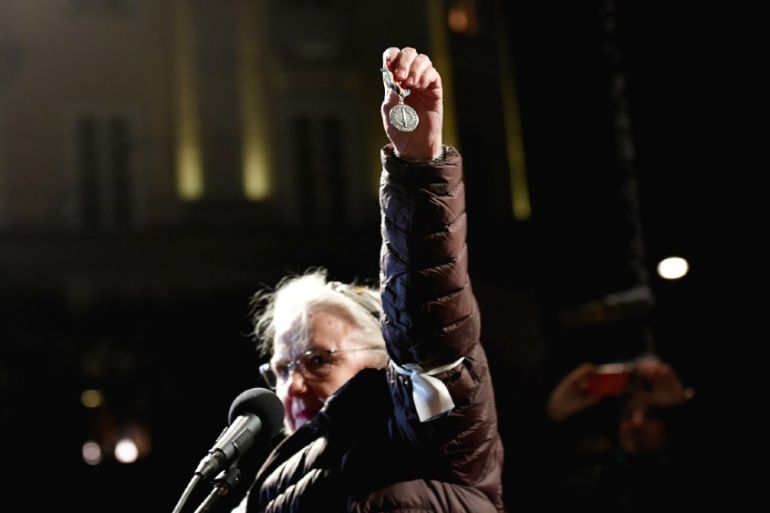Doctare to return Nobel medal in protest over genocide denier
The awarding of a Nobel prize to Milosevic-supporter Peter Handke has sparked widespread protests.

Sarajevo, Bosnia and Herzegovina – Christina Doctare, the Swedish physician and author, took part in a protest on Tuesday night in Stockholm – where the Nobel prize for literature was handed to Peter Handke, an Austrian author who denies the Bosnian genocide and supported the late Serbian President Slobodan Milosevic.
“I used to be proud of the Swedish Academy, but all I feel now is shame and guilt,” she said.
Keep reading
list of 3 itemsKosovo to boycott Nobel ceremony over Handke’s literature prize
Peter Handke and the power of denial
Speaking in front of a crowd of several hundred, she raised her own medal high above her head.
“He (Swedish King Carl XVI) congratulated him and gave him the award. Now, I’m returning mine; now, I’m returning mine,” she declared.
On Wednesday, Doctare told Al Jazeera it was “a shame that Handke was awarded the prize”.
“The academy has shown arrogance, ignorance and a lack of knowledge by giving Handke the award,” she said. “Literature can never be above war crimes. Those who say so have blood on their hands.”
Doctare’s Nobel Peace Prize was awarded to the UN peacekeeping forces in 1988, and all who had served from the 1950s and up to 1988 were symbolically offered a medal by the UN veteran associations in their respective countries.
“I served as the first Swedish female doctor in the Swedish battalion on Cyprus in 1974,” she said.
Handke often rejects the idea that a genocide occurred in Bosnia, leading many countries, organisations and individuals to protest against his Nobel award.
“Denial can be a strong psychological mechanism to protect both individuals and nations from unbearable feelings of shame and guilt and fear,” she told Al Jazeera.
“Of course, such an explanation is never an excuse for the war crimes and genocides. Political denials are, alas, very common. The consequences are often very costly for those in power when the truth is discovered.”
Doctare was one of first to tell the world about the systematic rape used as a weapon of war in Bosnia, where she was a humanitarian relief worker.
“I started my mission in the fall of 1992, [working] for the WHO to rehabilitate those injured in the war. When I discovered the systematic rapes, my task was also to rehabilitate the traumatised women,” said the doctor.
“The memories and my experiences are always with me and my life was changed profoundly. That is why I got so angry when Handke – a genocide denier – got awarded the prize.
“The Nobel prize has been tarnished, and there will be great difficulties in restoring its prestige again.”
Media reports in Serbia and Russia questioned the validity of her Nobel Prize.
“That is interesting, how Serbia and Russia try to use fake news and disinformation about the UN peacekeeping forces! We are thousands, tens of thousands, not to say hundreds of thousands of men and women who have risked our lives trying to keep and, also, create peace. All of us are worth this symbolical medal in memory of the Nobel Peace Prize”, replied Doctare.
‘Not welcome’
The Bosnian capital, Sarajevo, on Wednesday declared Handke “persona non grata” over his support for Milosevic and denial of the 1995 genocide in Srebrenica.
Sarajevo endured a 43-month siege by nationalist Bosnian Serb forces armed by Milosevic during a 1992-95 war following Bosnia’s secession from Serbian-led Yugoslavia. About 11,000 people died in the siege, at least 10 percent of whom were children, and more than 100,000 died in the war overall.
The Sarajevo cantonal assembly unanimously adopted a declaration on Wednesday proclaiming Handke unwelcome after he said in a recent interview that he might visit post-war Bosnia’s autonomous Serb region next year.
“His possible visit to our homeland … would prompt additional rage and humiliation of all victims,” read the declaration, which condemned awarding what it called a “genocide denier” this year’s Nobel Literature Prize.
Reflecting enduring ethnic divisions in Bosnia, Igor Radojicic, mayor of the Serb entity’s de facto capital Banja Luka, congratulated Handke and invited him to visit. Nationalist Serbs see Handke as a campaigner for their cause.
Sarajevo authorities could not prevent Handke visiting Serb Republic territory, though the declaration would allow them to bar him entry to Bosnia via the capital.
Bosnian Muslims and especially relatives of the 8,000 Muslim men and boys massacred by Serb forces in Srebrenica, Europe’s worst atrocity since the World War II, were outraged at the news that the Nobel Committee had honoured Handke. Other Balkan countries also criticised the decision.
The Swedish Academy’s choice of Handke drew widespread criticism as the Austrian novelist and playwright spoke at the funeral of Milosevic in 2006 after the Serbian leader died in detention in The Hague while facing trial for war crimes.
Handke has dismissed questions about his support for Milosevic.
Ibrahim Sofic contributed to this report.